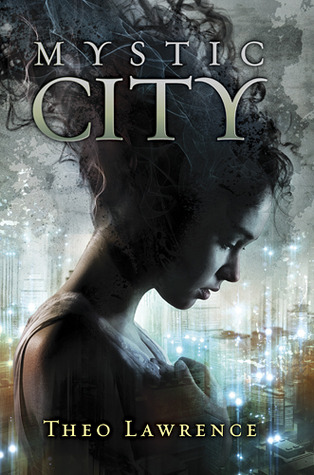 “MYSTIC CITY,” by Theo Lawrence, Delacorte Books for Young Readers, Oct. 9, 2012, Hardcover, $17.99 (ages 12 and up)
“MYSTIC CITY,” by Theo Lawrence, Delacorte Books for Young Readers, Oct. 9, 2012, Hardcover, $17.99 (ages 12 and up)
“Mystic City” is the tale of “Romeo and Juliet” with a twist — the ill-fated lovers actually end up together. Sort of.
Aria Rose is the daughter of one of Mystic City’s most influential men. In fact, her family is one of two ruling rival families much like to Montagues and Capulets. Aria is betrothed to Thomas Foster, the son of her parents sworn enemies. Their nuptials will bring an end to a generations-long political feud.
There’s only one problem. No, Aria and Thomas’ parents are not opposed to the union. Quite the opposite in fact. They seethe marriage as an opportunity to unite all those living in the Aeries, the privileged upper reaches of the city, against the banished mystics who dwell below in the Depths.
It all sounds perfect. Except. Aria doesn’t remember Thomas. Not at all. The two were supposedly sneaking around for months before their relationship was discovered, but Aria doesn’t remember one bit of it. Instead, she has huge gaps in her memory. Her parents say it’s a side effect of stic, a powerful drug that she was taking. But Aria doesn’t do stic. She doesn’t remember ever having tried it. Things just aren’t adding up.
When Aria goes searching for answers, she instead meets another mystery — Hunter. Hunter is a rebel mystic from the Depths, and though she has no memory of him, he seems familiar. As Aria gets to know Hunter she starts to gain glimpses into her missing past. Glimpses into things that could change thousands of lives forever.
Set in future Manhattan, readers familiar with New York City will have an upper hand with “Mystic City.” References to Central Park and the subway make more sense with a reference point to build on. A reader’s individual knowledge of the city will help build unique reference points that actually serve the story.
“Mystic City” is a mystery with a love story at its core. Aria isn’t a particularly compelling character, at least to begin with. She becomes more interesting as the story fleshes out. Thomas is, well, boring, and there’s not a lot to see with him. Hunter has more layers and is quite frankly more likable than his surrounding cast. It would have been nice if author Theo Lawrence had fleshed out his players a little more, as many feel one-dimensional.
“Mystic City” is a good story, but it’s not spectacular. I’ll probably read it’s follow-up, but only if it comes to my attention ahead of time. There’s nothing here that makes this story stand out from its contemporaries.
